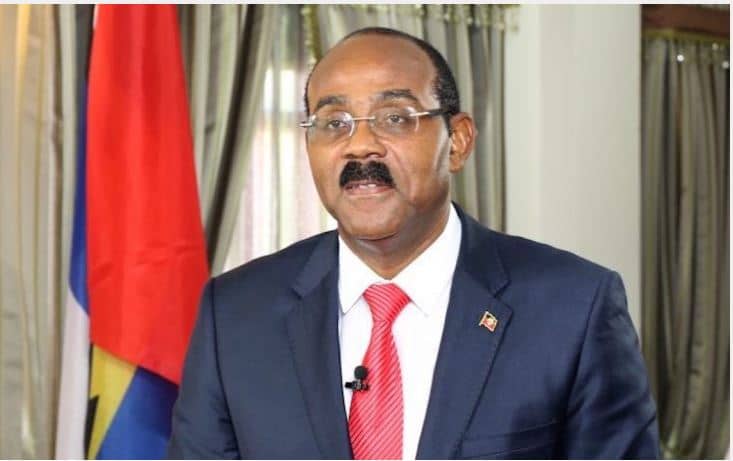
Antigua and Barbuda Prime Minister Gaston Browne Tuesday urged Caricom countries to move more urgently with the implementation of the Caricom Single Market and Economy (CSME) that allows for the free movement of goods, skills, labour and services across the region.
“We can no longer afford the luxury of delaying approval of key instruments such as the Financial Services Agreement, Investment Policy, Incentive Regimes and the Development and Regulation of a Regional Securities Market,” Browne said in his virtual address to the opening ceremony of the two-day 33rd Inter-Sessional Summit.
“The full operationalisation of the CSME is required for the transformation of our economies and to fight for a robust post coronavirus (COVID-19) recovery. Caricom needs to be able to shift gears and close its project implementation gaps, to ensure the full operationalisation of the CSME,” Browne told his regional colleagues.
The CSME is an arrangement among the 15-member Caricom member states for the creation of a single enlarged economic space through the removal of restrictions resulting in the free movement of goods, services, persons, capital and technology.
The decision in 1989 to establish the CSME was regarded as a move to deepen the integration movement to better respond to the challenges and opportunities presented by globalisation.
But there have been varying degrees of implementation of the CSME over the years and Barbados Prime Minister Mia Mottley, who has lead responsibility for the CSME within the quasi-Caricom cabinet, is expected to table a draft protocol aimed at pushing forward the further implementation of aspects of the initiative.
Browne, who was reporting on his six-month tenure as Caricom chairman, said that there are a number of urgent tasks confronting the integration movement, listing the situation in the French-speaking member state of Haiti as among the priorities.
“We need to work with Haiti in helping to resolve the deteriorating political situation in the country and the deepening public anxiety over citizen security,” Browne said, recalling also the assassination of President Jovenel Moise in July last year.

No one has yet been formally charged with his murder even though several people, including former members of the Colombian army, have been detained.
“This was an event almost unheard of in our region, but a tragic reminder that our region is not immune from the forces of instability and criminality swirling around the world.”
Browne said barely had Haiti come to terms with the tragic loss of its president than she was struck by an earthquake; followed shortly by the passage of Tropical Storm Grace.
“Our community has been engaged with Haiti at the highest political level, and has offered to assist in crafting a Haitian-led solution to the present crisis, that will garner the support of all the political forces in Haiti, as well as the international community,” Browne said.
He told the summit that citizen security and political legitimacy are what Haiti needs most at this time, and without these vital elements, Haiti’s economic and social prospects will remain grim.
“I am hoping that our community can be the bridge to the United Nations and other major organisations of the international community, to bring these needed elements to Haiti, as well as, a strong measure of humanitarian assistance, rigorously applied,” Browne said.
He said his six-month tenure had also coincided with the COVID-19 pandemic that has killed and infected thousands of people across the Community.
“Many of our member states struggled with the demands of the COVID-19 pandemic, that called for the vaccination of a significant portion of our populations in order to achieve herd immunity,” Browne said, noting that obtaining adequate supplies of vaccines on the international market became an issue, and even with the help of the Caribbean Public Health Agency (CARPHA) and the Pan American Health Organization (PAHO) and the establishment of the COVAX facility.
“Vaccine hesitancy also emerged as a significant regional challenge. We remain grateful to those countries of the international community which stepped forward to fill the gap, such as India and the United States,” Browne said.
Prime Minister Browne said that while there are several items that did not make it onto the agenda for this Inter-Sessional summit, “we must, however, continue to be vigilant in managing the threats of de-risking, the proposed global minimum corporation tax and sanction-listing of so-called uncooperative jurisdictions by the OECD (Organisation for Economic Co-operation and Development) and European Union.
“We must also enhance our negotiations of the EPA (Economic Partnership Agreement), to ensure that it delivers the promised benefits to all its members, including the LDC’s within Caricom,” Browne said, noting also that the provision of affordable broadband is a public good, as vital as the provision of water or electricity and should remain a regional priority.
“Diversification and rapid economic expansion through digitalisation require widespread enhancement of our Information and Communication Technology infrastructure. Therefore, the cost of telecommunications and access to cheaper and more efficient broadband is quintessential for robust economic growth and development,” he told the summit.
Advertise with the mоѕt vіѕіtеd nеwѕ ѕіtе іn Antigua!
We offer fully customizable and flexible digital marketing packages.
Contact us at [email protected]















